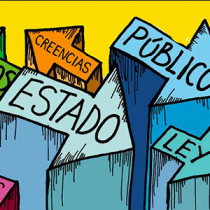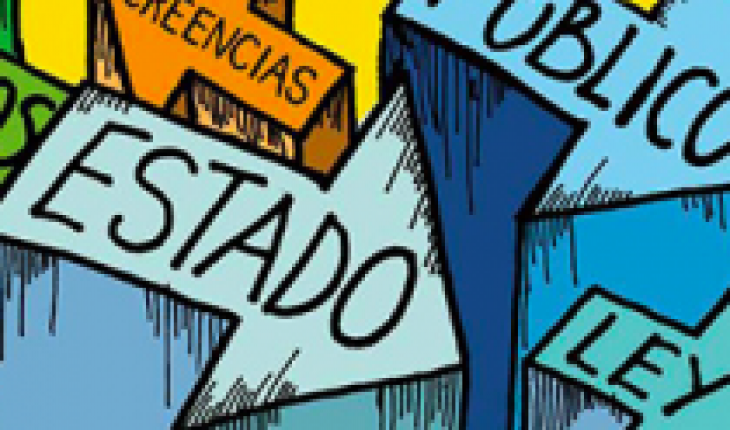
Not much is heard – to put it politely – about secularism in the constituents’ projects on the future Chile. And it is absolutely necessary to put this issue in the spotlight, in view of the continued interference of the Churches in public affairs. The latest invasive manifestation is recent: the declaration of the Standing Committee of the Episcopal Conference opposing marriage equality.
As a way of contributing to the reflection, I would like to refer here to the ideas of the philosopher and lawyer Paul Cliteur, born in Amsterdam in 1955; especially those poured into his book Moral Esperanto. For a secular ethic (2009).
His thesis is that in multicultural societies, as are the majority in our world – societies in which believers of various religious faiths and also people who do not profess any worship coexist – a better coexistence is possible if a minimum consensus can be established on certain moral principles. These moral issues must not be those values on which religious traditions already coincide by chance, but an understanding is needed in the way in which one is to speak of morality, in the way in which that morality is justified, that is to say, an understanding is required on the basis of an ethics. This ethic must play the role of a ‘language’ that is intelligible and acceptable to all citizens who believe or not, in order to debate from it what is to be judged in society as good or bad, right or wrong, permitted or forbidden.
Cliteur does not hesitate to declare that the ethics that can best play the role of “moral Esperanto” (a neutral language understood by all) is autonomous ethics, that is, one in which morality is not linked to religion. Religious ethics assumes that morality is based on sacred dogmas, that it is based on the word of God revealed in ancient texts. Autonomous ethics is secular, secular, does not resort to transcendentalist foundations to explain and justify moral conduct.
The problems of coexistence in a society are due, precisely, to the attempt to impose, by a fundamentalist religion (Catholic, evangelical, Islamic), a religious ethic to assess and judge moral and political issues. Fanatical devotees seek to impose their belief and language on those who do not participate in their creed, often even through violence. Cliteur writes: “Religious ethics, and more specifically the theory of the divine mandate of morality, is by definition an ethic that separates people. Moreover, it unites the religious, and sometimes also ethnic, group and disintegrates society. Only autonomous ethics allow in the long term peaceful coexistence between people of different religious traditions in a multicultural society.”
How is moral autonomy spread? Adopting a religiously neutral state model. The political-philosophical equivalent of autonomous ethics is a non-confessional state that addresses itself to citizens as citizens, not because of its membership in a particular ethnic or religious group, and that effectively implements the separation of morality and religion in its institutions.
This secular or neutral state – which admits all religions, but none occupies a position of privilege – does not advertise for one creed or another, nor does it publicly fund any church or religious institution. And it accepts as an also valid option the non-belief in any divinity or supernatural powers.
The establishment of a non-confessional State is the greatest guarantee for the successful management of relations between citizens of different cultural and religious traditions. It is the right space to favor moral Esperanto – a language acceptable to all that justifies a morality and politics far removed from religion.
In the face of the challenges of our time, the secularist stance needs to be consolidated and expanded to contribute to the better future of humanity. The ideal of a good human life, from this secular and secular point of view, requires the development of societies in which believers of the different religious denominations can coexist harmoniously together with those who do not profess any religion, for which human beings must take charge of their own destiny and not submit to precepts whose only legitimacy comes from the fact that tradition attributes them to God or to the Gods.
The public domain must be free of religious influences and faith must be confined to the personal sphere, only as a matter of observe.to private. The secular programme must apply not only to political power, but also to justice: only crime, misdemeanour against society, which must not be confused with sin, moral misconduct with regard to a particular religious tradition, must be repressed.
Likewise, the school has to escape the influence of ecclesiastical powers and become a space of open knowledge where the presentation and debate of all convictions takes place. This humanist ideal of secular and secular society – so necessary to cultivate in our Chilean democracy – has not abandoned sacredness. But what is sacred here is not religious dogmas, but the human rights that are the basis of people’s dignity.
The content of this opinion column is the sole responsibility of its author, and does not necessarily reflect the editorial line or position of El Mostrador.





